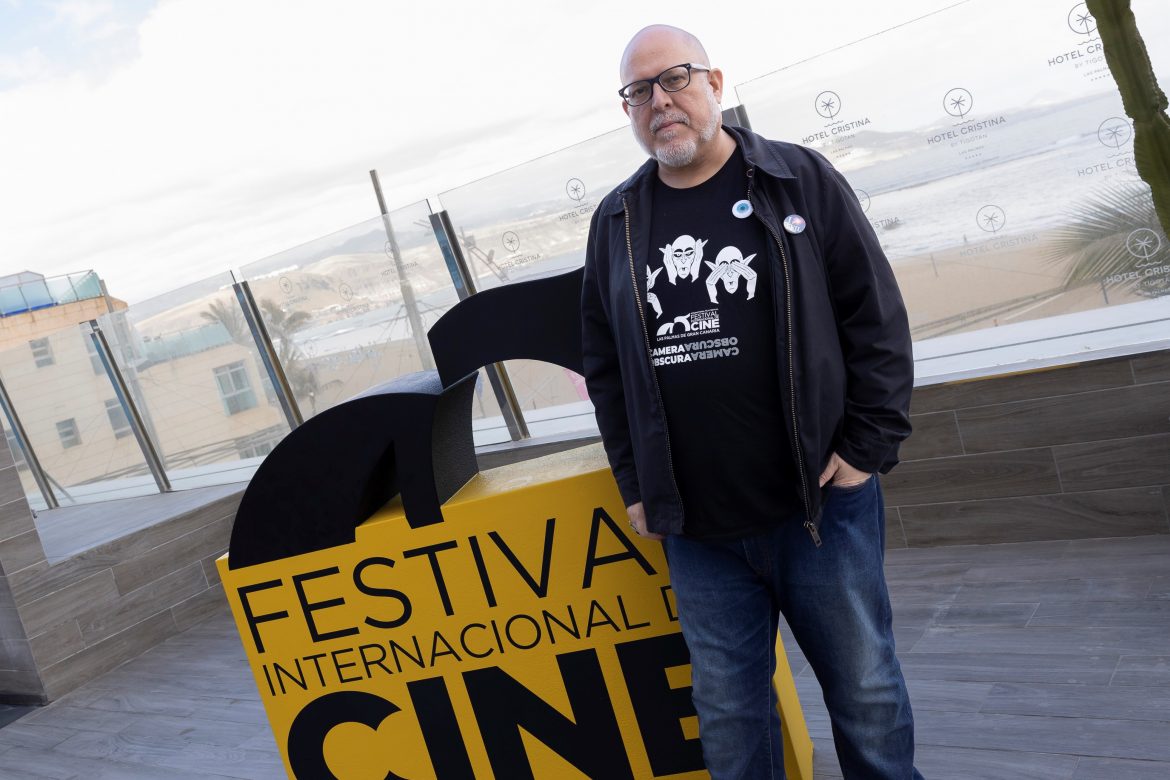➢ The first of the Freakiest Nights will begin this Friday, April 21, with the screening of the short film Phonorama (Alex Rey) and the French feature film La Gravité (Cédric Ido), and will continue on Saturday, April 22, with the short film Parking (Pepe Castro) and the Argentinean feature Legions (Fabián Forte). In both cases, at 10:00 p.m. at Cinesa El Muelle Screen 9
➢ Jesús Palacios claims that freak cinema is still alive and criticizes the fact that “Spanish institutions and producers ignore it: genre films are often the ones that best address these so-called serious issues.”
➢ The Freakiest Night stages its ‘twinning’ with the Isla de Calavera Festival by inviting some of its representatives to the screenings
Las Palmas de Gran Canaria, Thursday, April 20, 2023.- A selection in the freakiest sense: within the canon Jesús Palacios, programmer of the section, has built over the years at the Las Palmas de Gran Canaria Interational Film Festival. As in recent editions, The Freakiest Night will be divided into two sessions that have been designed to meet the expectations of its very particular audience. Very particular and very loyal. In 2023 they’ll enjoy French and Argentine features preceded, respectively, by two Spanish short films that embody Palacios’ inclinations when it comes to finding this genre production “in other cinemas that are far away from the Anglo-Saxon and Hollywood centers.” Thus, on April 21 and 22, at 10 p.m. at Cinesa El Muelle, the audience will once again be able to fulfill their yearly ritual.
Palacios has presented this edition’s program to the media on Thursday, April 20, in the halls of the Hotel Cristina by Tigotan, headquarters of the festival. It includes the short films Phonorama (Alex Rey) and Parking (Pepe Castro) and the feature films La Gravité (by French director Cédric Ido) and Legions (by Argentine Fabián Forte). With them, the programmer has vindicated the Spanish genre production while demonstrating his own ability to find pieces highly appreciated by fans “in other cinemas where those of us who love the true freak spirit really gravitate towards.”
Friday, April 21: Phonorama and La Gravité
- La Gravité
- Phonorama
The first session will take place this Friday, April 21, and will include the screening of Phonorama and La Gravité. Of Rey’s short film, Palacios emphasized its director’s style, “one of the talents of Spanish animation” and a creator “who does practically everything in his production.” He recalled another short film by Rey, The Amazing Vaccine of Doctor Dickinson, which was screened in last year’s edition of the festival, and described this new work by the director, screenwriter, animator and producer from Alicante as “a delirium of absurd Science Fiction that works very well, and that I believe will not disappoint our fans.”
As for La Gravité, the programmer described it as “freak cinema in the strictest sense.” A piece set in the banlieues, the suburbs on the outskirts of large French cities where many immigrant populations are concentrated.
For Palacios, Cédric Ido’s film depicts several places “in which French cinema had never before set foot,” those marginal neighborhoods “that have become almost a singular dystopia in which other films have already been set, but never in this way.” He also highlighted its ability to evocate Carpenter’s best films, but also its “own personality” and character.
Saturday, April 22: Parking and Legions
- Parking
- Legiones
In Saturday’s session, The Freakiest Night will screen Parking and Legions. Jesús Palacios stressed that Pepe Castro makes in Parking his directorial debut. The veteran professional photographer recovers in his short film “the spirit of other Spanish titles such as La cabina or La mancha, so well known to our fans. It meets the expectations of those horror films,” he added before pointing out two details of this story starring Fele Martínez that takes place in a parking. “On the one hand,” he noted, “Pepe Carabias is brought back, which I think is something worth mentioning.” And on the other hand, “it needs to be said that the soundtrack is by Lobos Negros, the legendary Spanish Psychobilly band.”
As for the Argentinean Legions, by Fabián Forte, Jesús Palacios presented it “almost as the highlight of this year’s selection, a mixture of black humor, horror, sorcery… as I like to say, a true story of geriatric humor.” He emphasized “its many visual homages to Sam Raimi’s Evil Dead saga” and the quality of a story that fits the canon of the genre.
Palacios also used this title as an example of the fact that “the permanent center of gravity of freak cinema has already shifted away from Hollywood or even Anglo-Saxon production: Argentine cinema, for instance, is lately turning a lot to genre films.”
Palacios’ presentation and synergies with Isla Calavera
It should be noted that, as usual, Palacios will introduce the screenings of the section to the audience. And he will do it together with Ramón González and Daniel Fumero, directors of the Isla Calavera festival in La Laguna. “I think it should be highlighted, because we wanted to externalize a kind of brotherhood with this festival, and establish synergies that are not very common,” said the programmer.
Freak vindication
The programmer and driving force behind The Freakiest Night claimed with his characteristic passion that the genre is still alive, as proven by the works he’s brought to the festival, because “the real freaks lean more towards this other side. Lately,” he observed, “it seems that it’s been spread an idea of freak that has nothing to do with what we do here: I don’t think the real freak would be satisfied with The Mandalorian, the zillionth Star Wars sequel or the latest zombie film that actually hides a drama about a divorce.”
Criticism of the Goyas
Once again, Jesús Palacios expressed in this edition his critical vision regarding the consideration that the most academic cinema in Spain dedicates to genre productions. “The Goya Awards, for example, do not take them into consideration,” he pointed out, “despite the fact that in Spain we have very good filmmakers who do interesting things. And there are good Spanish genre films.” Something that, in his opinion, “happens because it seems that this cinema is underestimated in favor of others that supposedly deal with social and truly relevant issues, when freak cinema is often the one that best addresses such issues.” Palacios sees “something almost political when this cinema is set aside, as it happened in the Pilar Miró era. In Spain, genre cinema is ignored by institutions and production companies, and also when it comes to programming.”
The role of platforms
Palacios also talked about the scenario that platforms have redrawn, “it’s not that tomorrow’s cinema is no longer there, it’s that this is the panorama of today’s cinema. Yesterday’s cinema will never come back.” From his point of view, “the fact that many of the films we are interested in programming at festivals first reach these spaces makes it more difficult for us to do our job, because in general we are asked to program unreleased films.” Although he stressed that “it is true that we can find a lot of movies that we like on these platforms, and that they themselves are, in a way, playing the role that B Series production companies used to play, putting money and resources in other countries where it would otherwise be more difficult to make this type of stories.”
The Las Palmas de Gran Canaria International Film Festival, organized by the Culture area of the Gran-Canarian capital’s City Council through Promoción de la Ciudad de Las Palmas de Gran Canaria, has received public assistance by the ICAA [Institute of Cinematography and Audiovisual Arts] and the program for the internationalization of Spanish culture, PICE Visitantes, of Acción Cultural Española (AC/E).
Among the Festival’s collaborators we may find Cinesa El Muelle, El Muelle Shopping Center, Hotel Cristina by Tigotan, the Elder Museum of Science and Technology or Casa África, places which also function as venues or hold activities of the film event; as well as other institutions and companies such as Sagulpa, Hospitales San Roque, Audiovisuales Canarias, Music Library & SFX or the International Bach Festival. Likewise, its market, MECAS, has been possible thanks to the sponsorship of the Gran Canaria Film Commission-Sociedad de Promoción Económica de Gran Canaria and the support of Canary Islands Film and Proexca.
The University of Las Palmas de Gran Canaria, the Mid Atlantic University, the the CIFP Felo Monzón Grau-Bassas, the Canary Islands Film Institute, the Audiovisual Cluster of the Canary Islands, Digital 104, CIMA [Association of Women Filmmakers and Audiovisual Media], the Asociación Microclima Cineastas de Canarias [Association of Filmmakers of the Canary Islands ‘Microclima’] and Tusity are also collaborators of the Festival.
Share this Post





